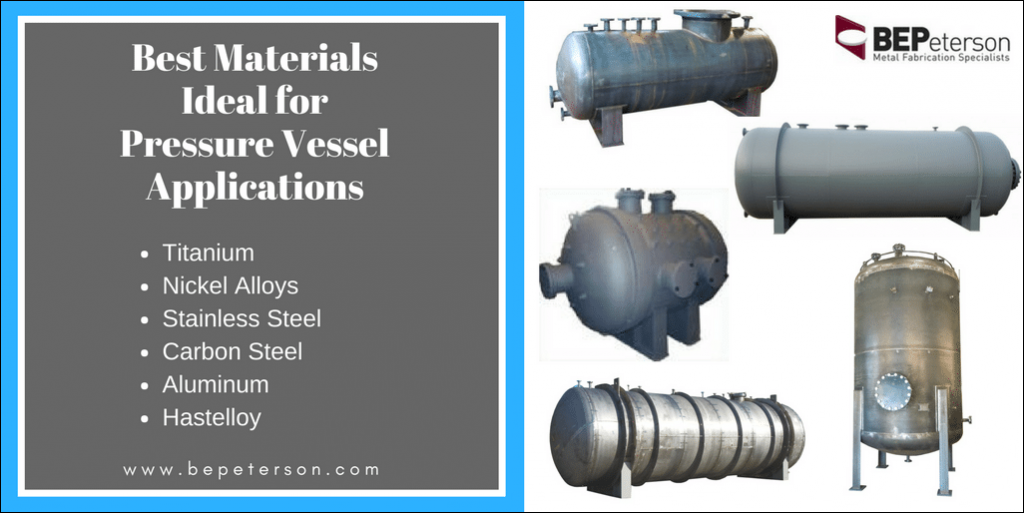Pressure vessels are among the most vital equipment in most industries. These are basically special containers that are designed in a way to hold liquids and gases at a pressure, which is extremely different from the ambient pressure. Therefore, the material used to manufacture these pressure vessels need to be strong enough to withstand high pressure, and prevent the container from exploding. There are special materials required for this job. What are these materials? What properties make them ideal for this application? Are you interested in knowing? Please read the following post, which discusses the different materials used for pressure vessels and their properties.
What are the Different Materials Used for Manufacturing Pressure Vessels?
| Pressure Vessel Material | Corrosion/Chemical Resistance | Tensile Strength (approx.) | Thermal/Temperature Behavior | Fabrication/Maintenance | Other Notable Properties | Typical Applications |
|---|---|---|---|---|---|---|
| Titanium | Excellent (seawater, many chlorides); forms protective oxide | 30–200 ksi (210–1380 MPa) depending on grade | High melting point (~1668°C); strength degrades above ~400°C | Welds require inert shielding; low maintenance in service | Biocompatible, non-toxic; high strength-to-weight | Chemical processing, desalination, pharma, where corrosion and weight matter |
| Nickel Alloys (e.g., Inconel, Monel) | Excellent in harsh/oxidizing/reducing media; resists oxidation/carburization | ~70–200+ ksi (480–1380 MPa) by grade/HT | Maintain strength at elevated temps; good thermal cycling tolerance | Weldable with proper procedures; long service life; high cost | High temperature capability | Severe service: high-temp/corrosive vessels, furnaces, petrochem |
| Stainless Steel (304L/316L) | High general corrosion resistance; 316L better vs chlorides; risk of pitting/crevice in strong chlorides | ~70–95 ksi (485–655 MPa) UTS | Good to moderate temps; typical pressure service up to ~425°C; good scaling resistance | Widely available; 304L/316L weldable; moderate maintenance (passivation) | Hygienic, cleanable surfaces | General-purpose vessels, food, pharma, water treatment |
| Carbon Steel (e.g., SA-516) | Low without protection; typically coated/lined | ~70–90 ksi (485–620 MPa) UTS | Good for moderate temps; may need impact testing at low temps | Easy to fabricate/weld; low cost; recyclable | High strength per cost | Broad use when corrosion is managed (linings, inhibitors) |
| Aluminum | Good atmospheric; susceptible to alkaline/chloride pitting; media-dependent | 10–100 ksi (70–700 MPa) by alloy/temper | High CTE; low melting (660°C); strength drops >150–200°C; good cryogenic toughness | Easy machining/forming; weldability alloy-dependent | Very light; good specific strength | Weight-critical or portable vessels; cryogenic service; typically low-to-moderate pressure |
| Hastelloy (e.g., C-276) | Excellent, including reducing acids and chlorides; resists SCC and cracking | ~100–115 ksi (690–790 MPa) UTS (C-276) | Strong corrosion resistance at elevated temps | Weldable; expensive; follow alloy-specific procedures | Multiple grades tailored to media | Oil & gas, petrochem, chemical processing, aggressive chemistries |
The materials used for pressure vessels go a long way into deciding its reliability and safe operation. Therefore, it is very important to make the right choice in selecting the perfect material for these containers. Here are some capable materials, which qualify for use in manufacturing high pressure vessels:
1. Titanium
There are several properties of this material, which make it ideal for pressure vessel application. These properties are as follows:
- Capability of retaining its structural properties
- Extremely resistant to corrosion
- Requires very little maintenance
- Excellent tensile strength ranging from 30,000 psi to 200,000 psi (210-1380 MPa)
- Higher melting point compared to steel and aluminum materials
- Great biocompatibility
- Non-toxic in nature
2. Nickel Alloys
The following properties of the nickel alloys are the strong points, which make the material suitable for use in this application:
- Provides excellent protection from thermal expansion
- Offers great resistance to corrosion
- Suitable for use in harsh environments
- Extremely reliable, and capable of lasting for several years
- Good resistance to oxidation and carburization
3. Stainless Steel
Pressure containers require robust construction, and this requirement is fulfilled by using different types of stainless steel. The following properties of this material are the reasons for using it for these containers:
- Extremely resistant to chemicals
- Has a high resistance to corrosion
- 304L stainless steel has a great weldability
- Capability of withstanding humid conditions, sunlight, or high temperatures
4. Carbon Steel
Pressure vessel manufacturers uses this material on large scale. Here are the reasons for choosing this material:
- Capable of retaining strength, even at minimal thicknesses
- Excellent tensile strength
- Resists vibrations and shock
- Can be recycled easily
5. Aluminum
This is yet another material, which is most commonly used in these vessels, for the following set of its properties:
- Capable of maintaining high tensile strength between 70 and 700 MPa
- Easier and more cost-effective to machine compared to stainless steel
- Has a larger coefficient of expansion compared to other metals
6. Hastelloy
If you are going to use pressure vessels in oil and gas, petrochemical, or chemical applications, then this is a well-suited material, for the following reasons:
- Has a good resistance to corrosion
- Capability to last for several years
- Has an excellent resistance to cracking
- Comes in a wide range of types, such as C276, S, C, B2, and more for use in several applications
Now that you know what materials are ideal for use, and their properties, it will help you in selecting the right material, based on your requirements. If you are still confused about making the right choice, you can always ask for help from the experts. BEPeterson is one such expert, which can help guide you in selecting the perfect material for your industrial pressure vessels. We are not experts in your process conditions which ultimately determine your best material but we certainly can help with direction and comments regarding the properties of all materials available to fabricate pressure vessels. Reach out and see how BEPeterson can help you today!

